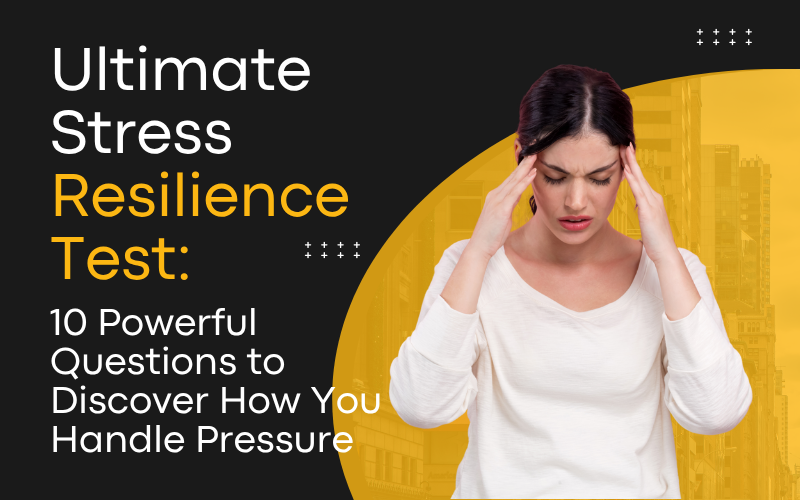Taking a stress resilience test can transform how you understand and manage life’s inevitable challenges. In today’s fast-paced world, stress has become an inevitable part of life. From workplace deadlines to personal challenges, financial pressures to relationship conflicts, we all face situations that test our ability to cope and adapt. But here’s the remarkable thing: people respond to stress in dramatically different ways. Some crumble under pressure, while others seem to thrive in challenging situations. What makes the difference? The answer lies in your unique stress resilience profile.
Understanding Your Stress Resilience Test Results
Stress resilience isn’t just about being “tough” or ignoring problems. It’s a complex combination of psychological, emotional, and behavioral patterns that determine how effectively you can navigate difficult situations while maintaining your well-being. This comprehensive stress resilience test will help you identify your unique stress response style, develop better coping strategies, improve your mental health, and even turn challenging situations into opportunities for growth.
The Science Behind Every Stress Resilience Test
Resilience is your psychological immune system—your ability to bounce back from adversity, adapt to change, and maintain stability in the face of disruption. Research shows that resilience isn’t a fixed trait you’re born with; it’s a skill set that can be developed and strengthened over time. This stress resilience test measures six critical factors that influence your stress response patterns.
Your stress resilience test profile is influenced by several key factors:
Cognitive Patterns: How you interpret and make sense of stressful events Emotional Regulation: Your ability to manage intense emotions during difficult times
Behavioral Responses: The actions you take when facing pressure Social Resources: How effectively you seek and use support from others Physical Management: Your awareness of and response to physical stress symptoms Recovery Ability: How quickly and completely you bounce back from setbacks
Different people excel in different areas, creating unique resilience profiles revealed through this stress resilience test. Some are natural problem-solvers who attack stress head-on, while others are emotional processors who work through feelings to find clarity.

Instructions: This stress resilience test will help you identify your stress resilience profile. For each question, choose the answer that best describes your typical response to stressful situations. Be honest about your actual reactions, not what you think you should do.
Stress Resilience Test Questions
Question 1: When facing a major deadline at work or school, you typically:
A) Create a detailed plan and work steadily through each step B) Feel overwhelmed at first, then talk through your concerns with others
C) Push through with intense focus, often working long hours D) Break the task into smaller pieces and tackle them one at a time E) Procrastinate initially, then work frantically at the last minute F) Seek help from colleagues or ask for deadline extensions
Question 2: During a heated argument with someone important to you, you:
A) Take a step back to cool down before addressing the issue rationally B) Express your emotions openly and encourage the other person to do the same C) Stand your ground firmly and argue your position passionately
D) Try to find a compromise that works for both parties E) Withdraw from the situation and avoid further conflict F) Become very upset and have difficulty controlling your emotional response
Question 3: When you receive unexpected bad news, your first reaction is usually to:
A) Immediately start thinking about practical solutions and next steps B) Feel the full impact of the emotions and process them thoroughly C) Spring into action to address the situation head-on D) Look for the silver lining or lessons to be learned E) Feel shocked and have trouble accepting what’s happened
F) Reach out to friends or family for emotional support and guidance
Question 4: During periods of high stress, you notice that you:
A) Become more organized and systematic in your approach to problems B) Need more time to talk through your feelings and thoughts C) Have bursts of high energy followed by periods of exhaustion D) Maintain your usual routines while adapting as needed E) Have trouble sleeping and feel physically tense F) Rely more heavily on others for advice and reassurance
Question 5: When facing a situation you can’t control, you typically:
A) Focus on the aspects you can influence and create action plans
B) Allow yourself to feel frustrated, then work through those emotions C) Keep pushing to find a way to exert control or influence D) Practice acceptance and look for ways to adapt positively E) Feel anxious and ruminate about all the possible negative outcomes F) Discuss the situation extensively with trusted friends or advisors
Question 6: Your biggest strength during stressful times is:
A) Logical thinking and problem-solving abilities B) Emotional intelligence and self-awareness C) Determination and ability to push through obstacles D) Flexibility and positive perspective E) Attention to detail and careful analysis F) Strong relationships and communication skills
Question 7: When stress affects your physical health, you most commonly experience:
A) Mental fatigue from overthinking situations B) Emotional exhaustion from processing intense feelings
C) Physical burnout from pushing yourself too hard D) Generally maintain good health with minor stress symptoms E) Anxiety symptoms like racing heart or difficulty breathing F) Social exhaustion from constantly seeking support
Question 8: After a stressful period ends, you typically:
A) Reflect on lessons learned and plan improvements for next time B) Need time to process the emotional experience fully C) Jump quickly into the next challenge or project D) Feel grateful for the growth and return to normal activities E) Feel relieved but worried about when stress might return F) Want to celebrate or debrief with others about the experience
Question 9: Your approach to preventing stress is usually to:
A) Plan ahead thoroughly and prepare for potential problems B) Maintain strong emotional awareness and regular self-check-ins C) Stay busy and productive to avoid dwelling on worries
D) Practice mindfulness and maintain a balanced lifestyle E) Try to avoid stressful situations whenever possible F) Build and maintain a strong support network
Question 10: When others come to you with their stress, you:
A) Offer practical advice and help them create action plans B) Listen empathetically and help them process their emotions C) Encourage them to take decisive action and face challenges directly D) Help them find perspective and focus on positive aspects E) Feel their stress as if it were your own F) Connect them with others who might be able to help
Scoring Your Stress Resilience Test
Count your responses for each letter:
A responses: _____ (Analytical Resilience) B responses: _____ (Emotional Processing Resilience)
C responses: _____ (Action-Oriented Resilience) D responses: _____ (Adaptive Resilience) E responses: _____ (Vulnerable Stress Response) F responses: _____ (Social Support Resilience)
Your highest score indicates your primary stress resilience style discovered through this stress resilience test. If you have close scores in multiple categories, you likely use a combination of approaches.

https://ladyvibestyle.com/how-to-fight-stress-and-poor-memory
Analytical Resilience (Mostly A’s)
Your Strength: You handle stress through logical thinking and systematic problem-solving. You excel at breaking down complex problems, creating organized plans, and maintaining rational perspective during crises.
How You Handle Pressure: When stress hits, you shift into analytical mode. You gather information, assess options, and create step-by-step action plans. You’re the person others turn to for practical solutions and clear thinking during chaotic times.
Stress Management Tips for Your Type:
- Create comprehensive contingency plans for important areas of your life
- Develop information-gathering systems to reduce uncertainty
- Practice mindfulness to stay present rather than getting lost in analysis
- Build in regular review sessions to process experiences and update your approaches
Emotional Processing Resilience (Mostly B’s)
Your Strength: You handle stress by fully experiencing and processing your emotions. You have high emotional intelligence and can navigate complex feelings to find clarity and healing.
How You Handle Pressure: When stress arrives, you allow yourself to feel its full impact. You’re not afraid of difficult emotions and understand that processing feelings is essential for moving through challenges effectively.
Stress Management Tips for Your Type:
- Create regular emotional check-in routines
- Develop multiple outlets for emotional expression (art, writing, movement)
- Practice distinguishing between processing emotions and ruminating
- Build time for emotional recovery into your schedule
Action-Oriented Resilience (Mostly C’s)
Your Strength: You handle stress through direct action and determination. You’re energized by challenges and have the drive to push through obstacles that would stop others.
How You Handle Pressure: When stress appears, you charge forward. You tackle problems head-on, work with intense focus, and maintain momentum even when others would give up.
Stress Management Tips for Your Type:
- Build recovery time into your schedule to prevent burnout
- Practice identifying which problems actually benefit from intense action
- Develop patience for situations that require waiting or gradual progress
- Create physical outlets for your high energy (exercise, sports, active hobbies)
Adaptive Resilience (Mostly D’s)
Your Strength: You handle stress through flexibility and positive reframing. You’re naturally resilient, able to find opportunity in crisis and maintain stability during change.
How You Handle Pressure: When stress comes, you adapt. You’re skilled at finding the positive aspects of difficult situations, maintaining perspective, and adjusting your approach as needed.
Stress Management Tips for Your Type:
- Trust your natural resilience while staying alert to signs of accumulated stress
- Practice expressing concerns or negative feelings when they arise
- Develop skills for situations that require more direct intervention
- Help others learn from your natural resilience strategies
Vulnerable Stress Response (Mostly E’s)
Your Stress Pattern: You tend to feel overwhelmed by stress and may struggle with anxiety, avoidance, or becoming stuck in worry cycles.
How Stress Affects You: When pressure mounts, you may experience physical symptoms, have trouble sleeping, or find yourself caught in negative thinking patterns. Stress feels threatening rather than challenging.
Stress Management Tips for Your Type:
- Develop a comprehensive stress management toolkit (breathing exercises, progressive muscle relaxation, mindfulness)
- Create predictable routines and environments when possible
- Practice gradual exposure to mild stressors to build confidence
- Consider professional support to develop personalized coping strategies
- Focus on building one resilience skill at a time
Social Support Resilience (Mostly F’s)
Your Strength: You handle stress through connection and collaboration. You’re skilled at building relationships, seeking appropriate help, and creating supportive communities.
How You Handle Pressure: When stress hits, you reach out. You process experiences through conversation, seek advice from trusted sources, and work through challenges collaboratively.
Stress Management Tips for Your Type:
- Cultivate diverse support networks for different types of challenges
- Practice being a good support receiver, not just giver
- Develop some individual coping skills for times when support isn’t available
- Learn to distinguish between helpful support-seeking and excessive dependency
Building Your Ultimate Stress Resilience Test Toolkit
Regardless of your primary resilience style revealed by this stress resilience test, you can strengthen your ability to handle stress by developing skills in all areas:
Cognitive Resilience: Practice reframing negative thoughts, challenging catastrophic thinking, and maintaining perspective during difficult times.
Emotional Resilience: Develop emotional awareness, learn healthy expression techniques, and practice self-compassion.
Physical Resilience: Maintain regular exercise, prioritize sleep, eat nutritiously, and learn relaxation techniques.
Social Resilience: Build strong relationships, practice asking for help, and contribute to your community.
Spiritual Resilience: Connect with your values, find meaning in challenges, and develop practices that nurture your sense of purpose.
The Science of Stress Response Your Test Measures
When you encounter a stressful situation, your body and mind activate a complex response system. Your sympathetic nervous system triggers the famous “fight-or-flight” response, flooding your system with stress hormones like cortisol and adrenaline. This stress resilience test helps you understand how you typically navigate this ancient survival mechanism in modern contexts.
The most resilient individuals have learned to work with their stress response rather than against it. They recognize that some stress is actually beneficial—what psychologists call “eustress”—providing the energy and focus needed to meet challenges. Understanding your personal stress signature through this stress resilience test is the first step toward building greater resilience.
Your Next Steps After Taking This Stress Resilience Test
Remember, stress resilience isn’t about avoiding all stress or never feeling overwhelmed. It’s about developing the skills and awareness to navigate life’s inevitable challenges with greater ease, learning, and growth. Your unique stress resilience test profile is a starting point for building an even stronger, more flexible response to whatever life brings your way.
The goal isn’t to eliminate stress entirely—that’s neither possible nor desirable. Instead, use your stress resilience test results to develop a personalized toolkit of strategies that help you handle pressure effectively while maintaining your well-being and continuing to grow from challenging experiences.
Taking this stress resilience test is just the beginning of your journey toward better stress management and enhanced mental resilience. Your results provide a roadmap for building the specific skills that will serve you best in life’s challenging moments.




